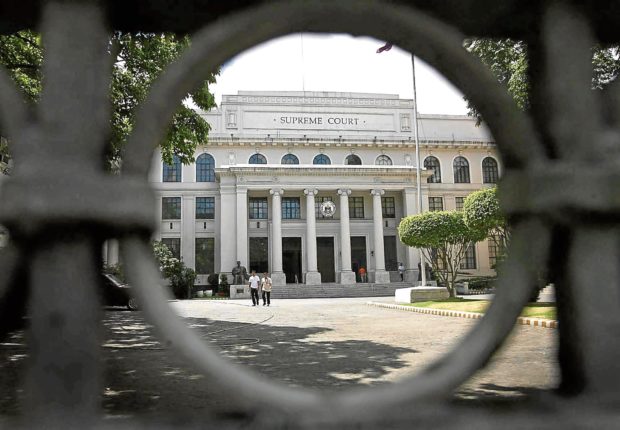
The Supreme Court building is viewed from its closed gateway. INQUIRER FILE PHOTO
MANILA, Philippines — Here’s good news for asylum seekers intending to become Juan dela Cruz.
In “the only judiciary-led initiative of its kind,” the Supreme Court has made it easier for stateless individuals and refugees seeking sanctuary in the country to acquire Philippine citizenship, including minors who have lost their parents and legal guardians.
The high court said in a statement on Wednesday that it approved Administrative Matter No. 21- 07-22, or the Rule on Facilitated Naturalization of Refugees and Stateless Persons, during its weekly en banc session on Tuesday.
The new policy was adopted nearly five months after President Duterte told the 76th United Nations General Assembly that the Philippines would provide asylum for Afghans who fled their country when the Taliban seized control of Afghanistan in August 2021.
“The approval of the rule is the judiciary’s contribution to the fulfillment of the Philippines’ pledges… to enhance the policy, legal and operational framework for refugees and stateless persons to ensure their full access to rights,” the 15-member tribunal said.
“It also puts into fruition the goal of the judiciary to ‘provide affordable and effective means of attaining justice’ by ‘introduc[ing] judicial reforms or streamlin[ing] court rules to ensure an efficient, fair and speedy delivery of justice,’” it added.
International commitments
The Supreme Court said the rule was consistent with the Philippines’ international commitments under the 1951 Convention Relating to the Status of Refugees, the 1967 Protocol Relating to the Status of Refugees, the 1954 Convention Relating to the Status of Stateless Persons, and the 1961 Convention on the Reduction of Statelessness.
It was primarily intended to rationalize the legal processes that refugees are required to hurdle in applying for a Philippine passport and to lessen their burden in securing a new nationality and legal identity, according to the high court.
“With the Philippines being the first country in Southeast Asia to accede to the 1954 and 1961 Conventions, the rule is the only judiciary-led initiative of its kind at the global level that facilitates the naturalization procedure for refugees and stateless persons,” it said.
Under the rule, asylum seekers who want to become Filipino citizens may publish their petition for naturalization through the high court’s website, the state-owned journal Official Gazette or the website of a local newspaper.
Traditionally, the courts require such judicial applications to be published in at least two newspapers of general circulation, which could cost thousands of pesos.
Vulnerable circumstances
The tribunal said the rule was made in recognition of the “special and vulnerable circumstances of refugees and stateless persons, such that the alternative modes of publication would reduce the necessary fees and be less burdensome for them.”
“Additionally, the provision on electronic publication is a step towards the goal of the Supreme Court to have a technology-driven judiciary that is capable of providing equal access to justice in real-time,” it said.
The rule likewise allows the Department of Social Welfare and Development, the local social welfare office, or organizations taking care of child refugees to file a petition for citizenship on their behalf.
“This is in accordance with the Philippines’ obligation under international instruments to ensure the right of a child to acquire a nationality, with the courts guided by the ‘best interests of the child’ principle,” the tribunal said.
The Supreme Court, which crafted the new policy under its rule-making power as stipulated in the 1987 Constitution, said the rule would be immediately implemented 15 days after its publication in two newspapers.
RELATED STORY
Dual citizens have right to engage in business in PH
Locsin: PH won’t engage in asylum talks unless on gov’t-to-gov’t basis